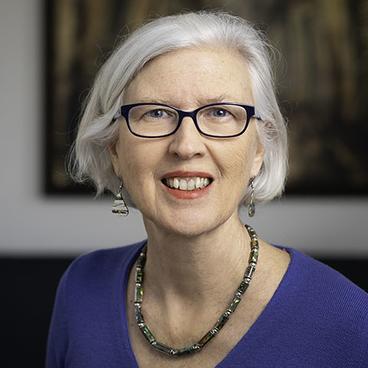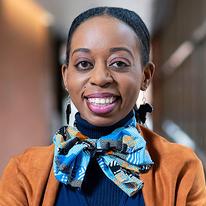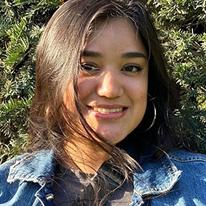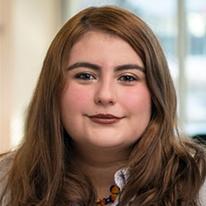
Barbara Frey left quite a legacy when she retired in 2022 as director of the University of Minnesota’s Human Rights Program (HRP). Frey is a champion of human rights advocacy in Minnesota; in addition to leading the HRP since it was established in 2001, she’s well known for speaking and writing about human rights topics on the national and international levels.
Before joining the University, Frey helped found two key human rights organizations in Minnesota—the Advocates for Human Rights and the Center for Victims of Torture. She directed the Advocates for its first dozen years, during which the organization became recognized internationally for its work.
Thanks to a fellowship program established two years ago in her honor, Frey’s legacy at the University is continuing. The Barbara Frey Fellowship supports one human rights graduate from the University annually to work for a year with an organization dedicated to the advancement of human rights at home or abroad.
Three graduates of the University’s Master of Human Rights program, which is jointly offered by the College of Liberal Arts and the Humphrey School of Public Affairs, have received Frey fellowships so far, and a fourth recipient will be chosen this spring.
The goal of the fellowships, Frey says, is to help new graduates gain professional experience that will help them advance their careers.
“Our graduates going into the human rights profession have skills and knowledge from their time at the University, but they don’t always have the professional experience they need to get a full-time job right away,” she says. “This fellowship acts as a bridge for them to start their career, and at the same time it raises the profile of our master’s program with human rights practitioners.”
Early success

The fellowship program is already making an impression. Frey points to the success of recent fellowship recipient, Hortense Minishi, a May 2023 Master of Human Rights graduate and an aspiring diplomat from Kenya.
Minishi spent her fellowship with the International Service for Human Rights (ISHR), a non-governmental organization (NGO) based in Geneva and New York that connects human rights defenders on the ground with international human rights systems and policy makers.
In her position at ISHR, Minishi focused on environmental human rights, helping to draft an amicus brief to the Inter-American Court of Human Rights, as well as an individual communication to the African Commission Working Group on the Environment and the UN Special Rapporteur on Environment.
Minishi says the fellowship “significantly accelerated my international career prospects by offering a unique opportunity to view the United Nations human rights system at work.” After her work with ISHR, Minishi was recruited for a full time position with KELIN Kenya, a human rights NGO in Kenya that focuses on health rights.
“Working with a well-respected organization like ISHR set up Hortense well for her subsequent professional work in the field," Frey says. "It was a great opportunity for Hortense to be seen and to understand the way these mechanisms work. Her goal is to work in diplomacy, so this fellowship gave her important international experience.”

Frey notes that ISHR was so impressed by the quality of the students who applied for the fellowship that it hired a second applicant on its own.
The organization brought on Socorro Topete (MHR ‘23) for a six-month internship to work remotely with the UN Anti-Racism Coalition, supporting the work of human rights defenders who are seeking remedies at the United Nations.
The Frey Fellowship will sponsor several additional months of Topete’s internship.
The first Frey Fellow, Verónica Cadavid González (MHR ‘22), was hired as a full-time program associate by the Advocates for Human Rights after completing her fellowship year there.
A unique offering
The University of Minnesota’s Master of Human Rights is unique in its interdisciplinary approach to the field, and post-graduate fellowships such as the Frey program are also unusual.

“Minnesota is known for its human rights expertise, and our students have done well in getting jobs in the field,” says Frey. “We hope the fellowship program will solidify these connections with organizations that are doing effective work. It’s a great incentive for human rights students to pursue their master’s degree at the University of Minnesota.”
Frey says the initial goal of the fellowship is to support 10 annual awards, and fundraising continues toward meeting that goal.
After her distinguished career as an advocate and teacher, Frey says it’s an honor to have this fellowship fund established in her name.
“My donor friends felt like this was the best way to make this fellowship visible in the donor community, because people have followed my work. It’s humbling, but it feels great,” she says. “Since this year will be the first year I’ve not taught any students, it’s a nice way to feel connected to them.”
Learn more about the Barbara Frey Fellowship and make a contribution online or by mail to:
The Minneapolis Foundation (“Barbara Frey Fund” on the memo line)
800 IDS Center, 80 South 8th Street
Minneapolis, MN 55402
Learn more about the Master of Human Rights program. The deadline to apply for enrollment in the fall 2024 semester is April 15.

